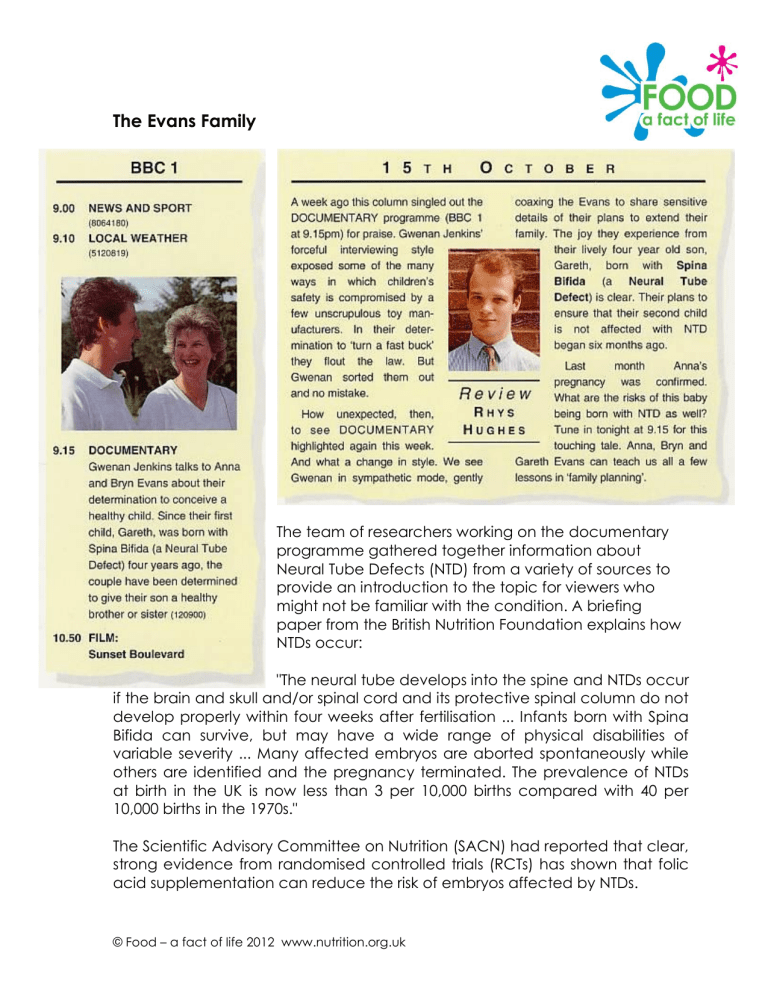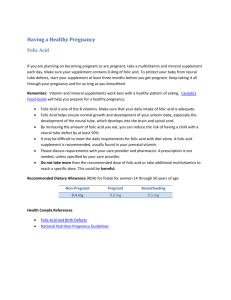
The Evans Family
The team of researchers working on the documentary
programme gathered together information about
Neural Tube Defects (NTD) from a variety of sources to
provide an introduction to the topic for viewers who
might not be familiar with the condition. A briefing
paper from the British Nutrition Foundation explains how
NTDs occur:
"The neural tube develops into the spine and NTDs occur
if the brain and skull and/or spinal cord and its protective spinal column do not
develop properly within four weeks after fertilisation ... Infants born with Spina
Bifida can survive, but may have a wide range of physical disabilities of
variable severity ... Many affected embryos are aborted spontaneously while
others are identified and the pregnancy terminated. The prevalence of NTDs
at birth in the UK is now less than 3 per 10,000 births compared with 40 per
10,000 births in the 1970s."
The Scientific Advisory Committee on Nutrition (SACN) had reported that clear,
strong evidence from randomised controlled trials (RCTs) has shown that folic
acid supplementation can reduce the risk of embryos affected by NTDs.
© Food – a fact of life 2012 www.nutrition.org.uk
The government recommends:
- that for parents of a child with NTD, or who have Spina Bifida themselves,
the mother should take 5mg supplements of folic acid daily prior to
pregnancy.
- that women who are planning a pregnancy should take an extra 0.4mg of
folic acid from the moment they start trying to conceive, and should
continue to take the supplement during the early months of pregnancy.
A local General Practitioner (GP) said:
“To protect against NTD it is important for women to
get adequate amounts of vitamin called folic acid in
the diet during the very early stages of pregnancy.
Folic acid can also help prevent a certain type of
anaemia and helps ensure a healthy pregnancy
It is important for women planning a pregnancy to
ensure they have enough folic acid in their diet.
Folic acid is found in food such as: fortified breakfast
cereals (check the labels, fortified bread (check the
labels), yeast extract, oranges, Brussels sprouts,
spinach, cabbage, potatoes, broccoli, peas.”
The Department of Health recommends that all
women of child-bearing age who are planning to
become pregnant are advised to take folic acid
supplements. Women who are not pregnant or
planning for a baby should be able to get all the folate
they need by eating a healthy, varied diet.
Questions
1. What has been the trend in numbers of babies born with NTDs since the
1970s?
2. Why was Anna advised to take folic acid supplements?
3. For a woman who is planning a baby what is thought to be the best time
for her to start taking folic acid supplements?
4. Suggest two ways of making sure that adequate amounts of folic acid
are provided by the regular diet.
5. Do you think that the DOCUMENTARY programme would help its viewers
to understand more about special nutritional requirements at particular
stages in the lifecycle? (Explain your answer.)
© Food – a fact of life 2012 www.nutrition.org.uk



